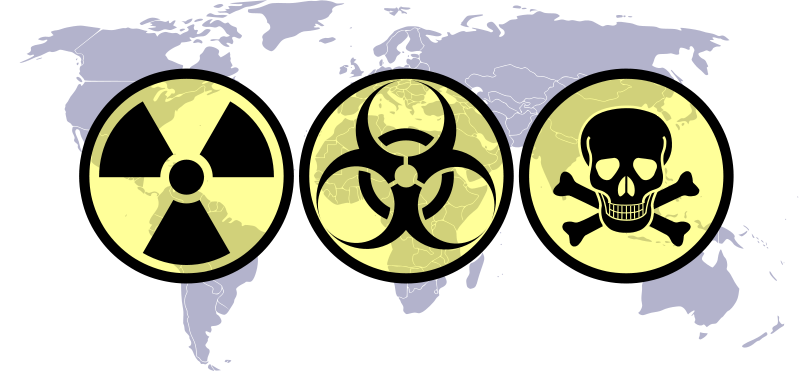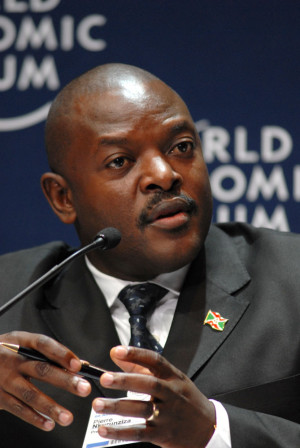Despite the continuing bloody stalemate in the Syrian civil war, there may be one unlikely winner in light of recent developments: the global non-proliferation and disarmament regime. Under the terms of the recent framework negotiated by the US and Russia, Syria has decided to accede to the Chemical Weapons Convention (CWC) and by doing so become a member of the Organization for the Prohibition of Chemical Weapons (OPCW), and commit itself to the destruction of its chemical weapons under international oversight.
Furthermore, the recently elected President of Iran, Hassan Rouhani, continues to strike far more conciliatory tones with his Western counterparts than his predecessor, leading to hopes that progress may finally be made in negotiations surrounding Iran’s nuclear program.
In contrast to the widespread turbulence currently ocurring in the Middle East, could these developments lead to sustained progress towards establishing that long sought after goal, a WMD-free zone in the Middle East?
A History of Violence
Uniquely for a world region, WMDs have played an important role in modern Middle Eastern conflicts. In fact, it is the only region where WMDs have been used as instruments of war since the nuclear bombings of Hiroshima and Nagasaki in 1945. Egypt used chemical warfare when it fought Yemen in the 1960s, Libya used it against Chad in 1987, Iraq utilized chemical agents both against its own Kurdish population and its adversary in the Iran-Iraq War, and the Assad government used them against rebels in the Syrian civil war in 2013. Furthermore, preventing rival states from acquiring WMDs has been a major driver of conflict in the region.
Perhaps for this reason, it is also the only world region where serious negotiations have taken place to eliminate all forms of WMDs: nuclear, chemical and biological, entirely. As early as 1974, Egypt and Iran proposed a nuclear weapons-free zone in the Middle East at the UN General Assembly. In 1990, Egypt’s President Hosni Mubarak called for the elimination of all WMDs in the region, under terms that became known as the Mubarak Plan. The 1995 Non-proliferation Treaty Review and Extension conference similarly adopted a resolution on the Middle East calling for a WMDFZ.
Despite these laudable attempts at regional disarmament, actual progress has been far more meagre. Some token achievements have been the of some regional states to the CWC and related treaties, and the unilateral renunciation of WMDs by Libya and Iraq. But progress in comprehensive disarmament continues to be hampered by several major obstacles.
Roadblocks
For one, WMDs are seen as serving an important strategic purpose by their possessors. Israel, which maintains an official policy of nuclear ambiguity, is widely known to be the only regional state with nuclear weapons. It considers them essential to its national survival in a region of hostile neighbours, not all of which recognize Israel’s right to exist as a political entity. Similarly, other regional states maintain that their WMD capacities are necessary safeguards against Israeli conventional and nuclear superiority.
Secondly, issues of non-proliferation and disarmament are inextricably linked to broader security questions in the Middle East, first and foremost the Israeli-Palestinian conflict. Israel, seeing its nuclear weapons arsenal as defensive in nature, takes the position that any progress in disarmament must follow progress in the peace process, so as not to expose itself to belligerent actions by its neighbours, should it dismantle its nuclear weapons.
Its neighbours take the opposite position. Considering the Israeli nuclear weapons as tools to protect the occupation of territories in Syria, Lebanon and the West Bank, they argue that Israeli nukes are the primary obstacle in the way of establishing a WMDFZ in the Middle East.
Lastly, the general level of mistrust between regional countries and the absence of effective regional forums inhibit meaningful negotiation on arms control.
Reasons for Hope
Without discounting the size of these obstacles, there is reason to be cautiously optimistic. For one, the decision by Syria to relinquish its chemical weapons may in itself provide a symbolic impetus for going forward in eliminating WMDs from the region. Indeed, in the context of the agreement reached with Syria, Russia has already called for renewed efforts towards the establishment of a WMDFZ in the Middle East. While this may not amount to much more than rhetoric, the simple fact that international attention has been called to the issue should be regarded positively.
In addition, all regional players have traditionally regarded the issue of WMD disarmament holistically, with Israel seeing its nuclear weapons as a defense against its adversaries chemical and biological capacities, and vice versa. Thus, any unilateral steps taken towards disarmament, such as Syria’s, will reduce the strategic value of possessing WMDs for other countries.
Finally, while the current political turbulence all across the Middle East and North Africa may not seem especially conducive to disarmament negotiations, progress has often been made following major political change. Denuclearization in Africa followed the end of South Africa’s apartheid regime, and Latin America became a nuclear weapons free zone after the democratization of Brazil and Argentina.
Disarmament is clearly a long-term process, but recent events suggest that some progress on ridding the region of WMDs may be made in the not too distant future.



